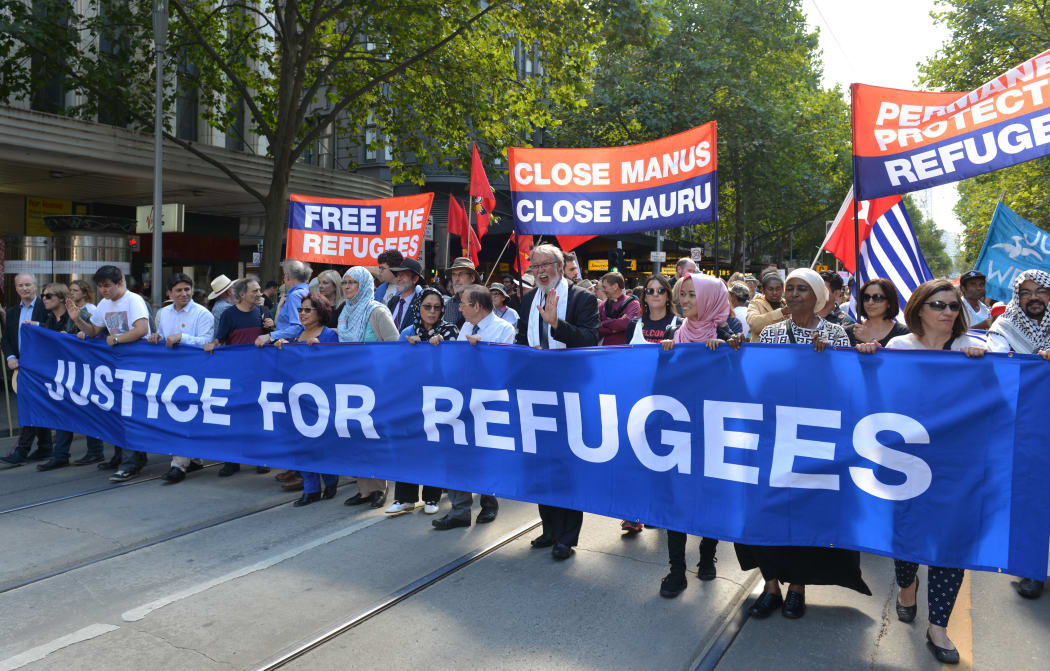Human rights agencies are demanding the closure of Australian-run detention camps on Nauru, after leaked documents revealed the level of trauma and abuse suffered by children there.
The Guardian has published more than 2000 incident reports from the asylum seekers' camps, and said it was likely to renew calls for an end to the political impasse that has seen children in Australia's care languish on Nauru for more than three years.
Its analysis revealed that more than half of the leaked reports concerned children despite them making up just 18 percent of the inmates.
Sydney-based journalist Paul Farrell, who worked on the project, said the files had produced a "staggering" portrait of everyday life for detainees in Nauru.
"It's everything. It's everything that happened on a given day in Nauru. You can go through and search by day, you can search by month, you can search by category of incident.
"It's the most comprehensive portrait we've ever seen of this detention facility."
It was not credible that the Australian government didn't know what was happening in the camps, he said.
"These incident reports have been made to comply with the Australian Immigration Department's reporting protocols.
"They get these incidents, they know what's happening there, but all these serious reports are continuing to occur."
GetUp activist Shen Narayanasamy said the files indicated the situation on Nauru was much worse than previously thought.

Refugees and asylum seekers take part in a protest on Nauru (file). Photo: supplied Refugee Action Coalition
"The real question for [Australiam Prime Minister Malcolm Turnbull] is clearly we know children are being sexually abused, women are being abused and men are being detained for years without charge. At what point is he going to understand that torturing people in this manner is not legitimate government policy?"
Two years ago, Australian Human Rights Commissioner Gillian Triggs presented similar evidence to its parliament, and said the number of children affected was distressing
"It is very sad to realise the statistical incidents of these incident reports in relation to children is far higher, and we reported that as well," she said.
The reports range from a guard allegedly grabbing a boy and threatening to kill him once he was living in the community to guards allegedly slapping children in the face.
Seven reports of sexual assault of children, 59 reports of assault on children, 30 of self-harm involving children and 159 of threatened self-harm involving children are also contained in the files.

Australian Prime Minister Malcolm Turnbull has said asylum seekers will not be resettled in Australia. Photo: AFP
Human Rights Law Centre executive director Hugh de Kretzer said children were being warehoused on Nauru in conditions that allowed this abuse to thrive, and the camps must close.
"It is so clear the cruelty the Australian government is inflicting on people," he said.
"The decent response to this is to act now and bring them to Australia. That is what the government needs to do."
In the wake of the release, human rights and refugee bodies in Australia have launched a campaign called "Bring Them Here" to have the inmates and refugees taken to Australia.
Canberra defends Nauru camps following leak
In a statement, the Australian government said the documents were historical and many of the incidents reflected unconfirmed allegations.
But Anmesty's New Zealand director, Grant Bayldon, rejected the claim the documents were historical.
"Based on our research which was conducted just weeks ago, what's in these files is entirely consistent with what's still going on right now," he said, echoing the call for the camps to be closed.
"The Australian government needs to close these offshore detention centres immediately, it needs to bring people back to Australia and it needs to deal with them humanely."

Thousands of Australians march in Melbourne in March to demand refugees not be sent back to Nauru or Manus Island. Photo: Recep Sakar / ANADOLU AGENCY
The Australian government's statement also said the documents had been the subject of previous reporting by the Department of Immigration and Border Protection in relation to the overall number of recorded incidents over time.
"Many of the specific examples and cases quoted in the reports have been the subject of extensive previous media coverage and reporting by the department," it said, adding that it continued to support the Nauruan government to provide for the health, welfare and safety of all transferees and refugees.
The department was seeking urgent advice from its service providers to confirm all of matters mentioned in the reports had been previously and appropriately reported to it, and were consistent with its policies and procedures.





